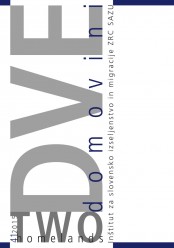Transmigranti, transnacionalne povezave in načini pripadanja: primer bangladeških migrantov v Italiji
Ključne besede:
transmigranti, transnacionalne vezi, načini pripadanja, bangladeški migranti, ItalijaPovzetek
V študiji skušava razumeti transnacionalne povezave bangladeških migrantov v Italiji z njihovo domovino in »načine pripadanja«, s pomočjo katerih te povezave izražajo. Raziskava temelji na mešanih metodoloških pristopih, tako kvantitativnih kot kvalitativnih. V prvi fazi je bilo v anketo vključenih 100 migrantov, v drugi fazi pa je bilo opravljenih še 12 polstrukturiranih intervjujev. Rezultati kažejo, da velika večina bangladeških migrantov vzdržuje močne transnacionalne vezi z domovino. Tja pošiljajo remitnine, negujejo stike in obiskujejo svoje družine, sorodnike, prijatelje, znance. Rezultati nakazujejo tudi močne občutke pripadnosti njihovi domovini.
Prenosi
Literatura
Alexander, Claire, Firoz, Shahzad, Rashid, Naaz (2003). The Bengali Diaspora in Britain: A Review of the Literature, http://www.banglastories.org/uploads/Literature_review.pdf (4. 2. 2014).
Carling, Jorgen (2008). The human dynamics of migrant transnationalism. Ethnic and Racial Studies 31/8, 1466–4356.
Castles, Stephen, Miller, Mark, J. (2009). The Age of Migration: International Population Movements in the Modern World, 4th edition. Basingstoke: Palgrave MacMillan.
Cheran, Rudhramoorthy (2003). Diaspora Circulation and Transnationalism as Agents for Change in the Post Conflict Zones of Sri Lanka, https://www.unitar .org/ny/ sites/unitar.org.ny/files/DiasporaCirc. pdf (7. 3. 2014)
Coughlan, Reed (2011). Transnationalism in the Bosnian Diaspora in America. The Bosnian Diaspora: Integration in Transnational Communities (eds. Marko Valenta, Sabrina Petra Ramet). Farnham: Ashgate, 105–122.
Eade, John, Garbin, David (2006). Competing Visions of Identity and Space: Bangladeshi Muslims in Britain. Contemporary South Asia 14 /2, 181–193.
Frykman Povrzanović, Maja (2001). Construction of identities in diaspora and exile: Croats in Sweden in the 1990s. Beyond Integration: Challenges of belonging in diaspora and exile (ed. Maja Povrzanović Frykman). Lund: Nordic Academic Press, 166–194.
Garbin, David (2005). Bangladeshi diaspora in the UK: some observations on socio-cultural dynamics, religious trends and transnational politics, http://surreyweblb.surrey. ac.uk/cronem/files/BE04B01Ed01. pdf (10. 4. 2014).
Garbin, David (2008). A Diasporic Sense of Place: Dynamics of Specialization and Transnational Political Fields among Bangladeshi Muslims in Britain, http://www.academia.edu/223543/A_Diasporic_Sense_of_Place_Dynamics_of_Spatialization_and_Transnational_Political_Fields_among_Bangladeshi_Muslims_in_Britain (16. 8. 2014).
Glick Schiller, Nina, Basch, Laura, Szanton-Blanc, Christina (1995). From immigrant to transmigrant: theorizing transnational migration, Anthropological Quarterly 68/1, 48–63.
Guarnizo, Luis, E., Diaz, Luz, M. (1999). Transnational Migration: A View from Colombia. Ethnic and Racial Studies 22 /2, 397–421.
Guarnizo, Luis, E. (2003). The Economics of Transnational Living. International Migration Review 37/Fall, 666–699.
Knights, Melanie (1996). Bangladeshi immigrants in Italy: from geopolitics to micro-politics. Transactions of the Institute of British Geographers, New Series 21/1, 105–23.
Levitt, Peggy (2001).Transnational Migration: Taking Stock and Future Directions. Global Networks l/3, 195–216.
Levitt, Peggy, Waters, Mary, C. (2002). Introduction. The Changing Face of Home: The Transnational Lives of the Second Generation (eds. Peggy Levitt and Mary C. Walters). New York: Russell Sage Foundation, 1–28.
Mand, Kanwal (2010). ‘I’ve got two houses. One in Bangladesh and one in London ... everybody has’: Home, locality and belonging(s)’. Childhood 17/2, 273–287.
Olwig, Karen F. (2003). Transnational Socio- Cultural Systems and Ethnographic Research: views from an Extended Field Site. International Migration Review, 37/3, 787–811.
Orozco, Manuel (2005). Diasporas, Development and Transnational Integration: Ghanaians in the U.S., U.K. and Germany, http://w.thedialogue.org/PublicationFiles/Ghanaian%20 transnationalism.pdf (3. 9. 2014).
Rahman, Mizanur, Md., Kabir, Alamgir, Mohammad (2012). Moving to Europe: Bangladeshi Migration to Italy, http://www.isas.nus.edu.sg/Attachments/PublisherAttachment/ ISAS_Working_Paper_142_-_email_-_Moving_to_Europe_-_Bangladesh_Migration_ to_Italy_07022012143721.pdf (4. 4. 2014)
Siddiqui, Tasneem (2004). Institutionalizing Diaspora Linkage: The Emigrant Bangladeshi in UK and USA, http://www.samren.net/Research_Papers/doc/Institutionalising%20Diaspora%20Linkage%20 %20The%20Emigrant%20Bangladeshis%20in%20UK%20and%20USA%20bangladesh%20diaspora. pdf (8.4. 2014)
Valenta, Marko, Strabac, Zan (2011). Transnational ties and transnational exchange. The Bosnian Diaspora: Integration in Transnational Communities (eds. Marko Valenta, Sabrina Petra Ramet). Farnham: Ashgate, 163–184.
Verhulst, Stefaan (1999). Diasporic and Transnational Communication: Technologies, Policies and Regulation, The Public 6/1, 29–36.
Vertovec, Steven (2001). Transnationalism and identity. Journal of Ethnic and Migration Studies 27/4, 573–82.
Vertovec, Steven (2003). Migration and other Modes of Transnationalism: Towards Conceptual Cross- -Fertilization. International Migration Review 37/3, 641–665.
Vallianatos, Helen, Raine, Kim (2008). Consuming food and constructing identities among Arabic and South Asian immigrant women. Food, Culture and Society: An International Journal of Multidisciplinary Research, 11/3, 355–373.
Zeitlyn, Benjamin (2006). Migration from Bangladesh to Italy and Spain. Occasional paper 11. Dhaka: Refugee and Migratory Movements Research Unit, University of Dhaka.
Prenosi
Objavljeno
Kako citirati
Številka
Rubrike
Licenca

To delo je licencirano pod Creative Commons Priznanje avtorstva-Nekomercialno-Brez predelav 4.0 mednarodno licenco.
Avtorji jamčijo, da je delo njihova avtorska stvaritev, da v njem niso kršene avtorske pravice tretjih oseb ali kake druge pravice. V primeru zahtevkov tretjih oseb se avtorji zavezujejo, da bodo varovali interese založnika ter da bodo povrnili morebitno škodo.
Podrobneje v rubriki: Prispevki





